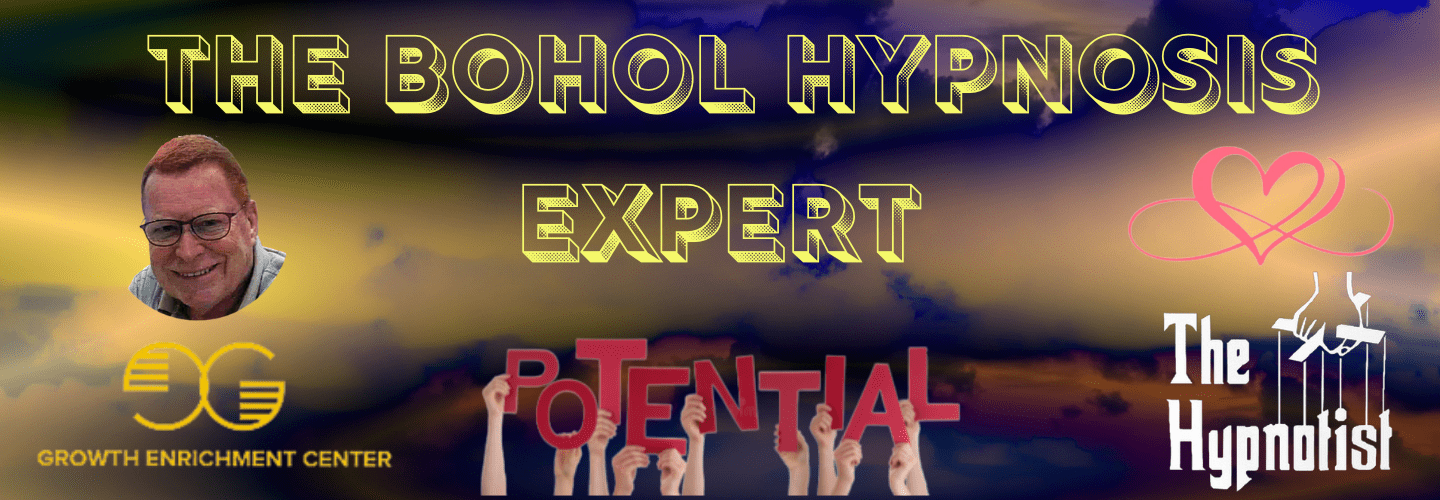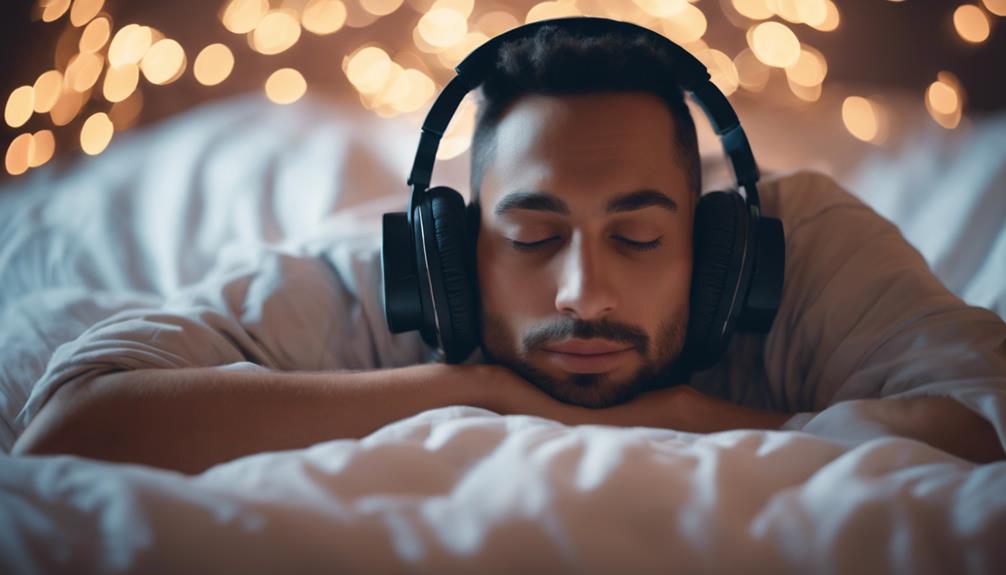
Self-hypnosis audio enhances sleep quality by promoting deep relaxation and reducing stress. It aids in achieving a state of tranquility through guided imagery, benefiting overall well-being. Techniques like visualization and muscle relaxation help calm the mind for improved sleep patterns. With soothing backgrounds and specific instructions, it reframes negative thought patterns to enhance sleep. Self-hypnosis audio is a valuable tool to relax the mind and body, aiding in sleep quality naturally. This method can be an effective way to enhance sleep quality and promote a restful state of mind.
Key Takeaways
- Facilitates deep relaxation for improved sleep quality.
- Reduces stress and anxiety levels before bedtime.
- Enhances mind-body connection for tranquility.
- Rewires negative thought patterns related to sleep.
- Guides the mind into a state of relaxation for better sleep.
Benefits of Self-Hypnosis Audio
Self-hypnosis audio offers a range of benefits that can positively impact individuals seeking to improve their sleep quality and overall well-being. One key benefit is the cognitive advantages that self-hypnosis audio provides. By engaging in self-hypnosis practices, individuals can enhance their focus, concentration, and memory. This can lead to improved cognitive function during the day and potentially contribute to better sleep quality at night.
Moreover, self-hypnosis audio aids in emotional regulation. Through guided imagery and relaxation techniques, individuals can learn to manage stress, anxiety, and other negative emotions more effectively. By incorporating self-hypnosis into their daily routine, individuals may experience reduced emotional distress, leading to a more peaceful mind and improved sleep patterns.
How Self-Hypnosis Aids Relaxation
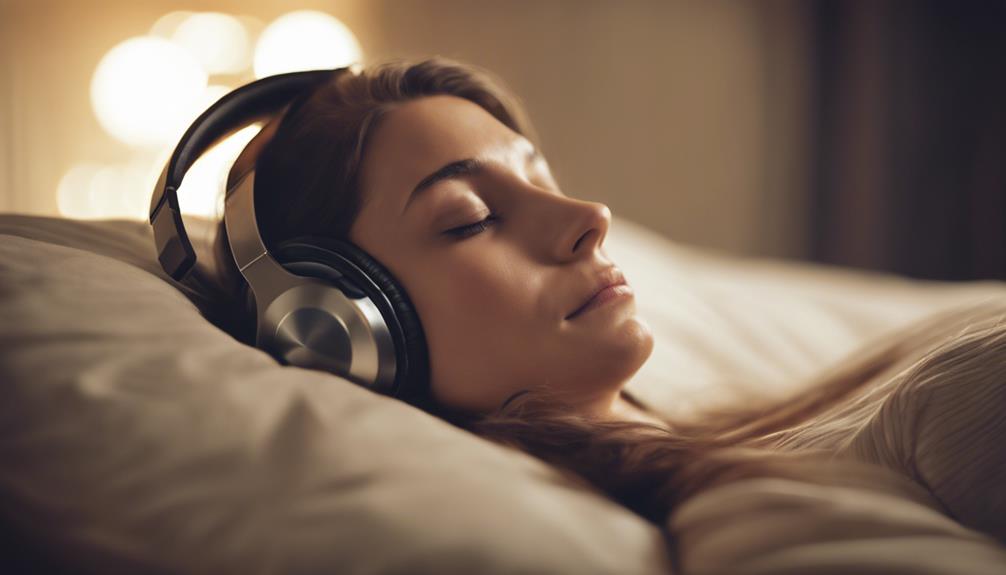
Facilitating a state of deep relaxation, self-hypnosis techniques can assist individuals in achieving a heightened sense of calmness and tranquility. Stress relief is a significant benefit of self-hypnosis, as the practice helps reduce the levels of cortisol, the stress hormone, in the body. By inducing a state of relaxation through self-hypnosis, individuals can experience a decrease in anxiety and tension, leading to an overall sense of well-being.
Self-hypnosis also taps into the mind-body connection, emphasizing the powerful relationship between mental and physical health. When practicing self-hypnosis for relaxation, individuals can learn to harness the mind's ability to influence the body's responses, promoting a sense of peace and comfort. This mind-body connection is essential for managing stress and enhancing relaxation, as it allows individuals to cultivate a harmonious balance between their thoughts and physical sensations.
Incorporating self-hypnosis into a relaxation routine can be a valuable tool for improving overall well-being and promoting a restful state of mind.
Improving Sleep Patterns With Hypnosis
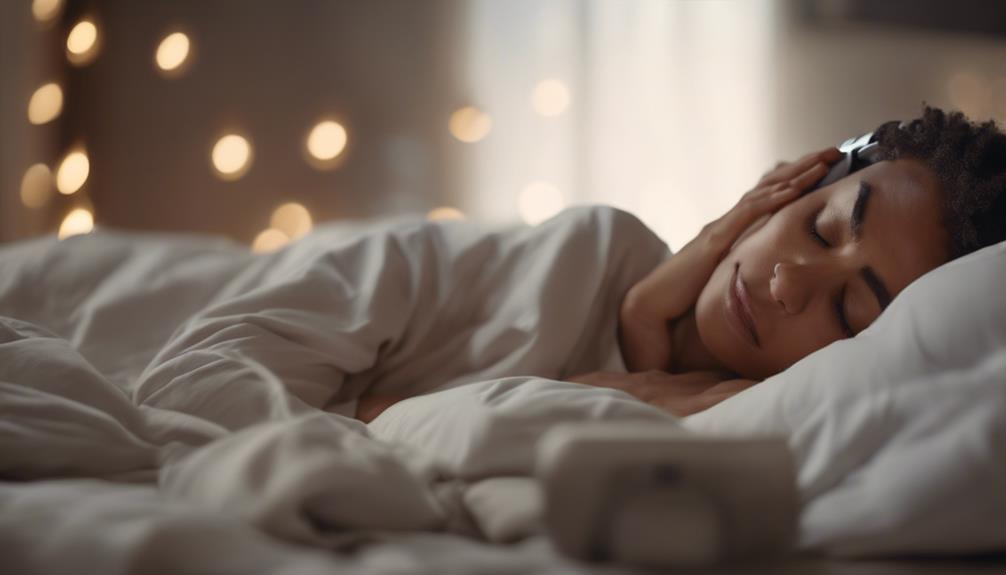
Harnessing the power of hypnosis to enhance sleep quality involves tapping into the mind's ability to influence the body's natural sleep patterns and promote restful slumber. Sleep hygiene, which includes creating a conducive environment and following a consistent bedtime routine, is essential for improving sleep patterns. Hypnosis can complement these practices by addressing underlying psychological factors that may be disrupting sleep.
The mind-body connection plays a significant role in how hypnosis can improve sleep. By entering a state of deep relaxation through hypnosis, individuals can lower their stress levels, reduce anxiety, and calm racing thoughts that often interfere with falling asleep. This relaxation response can help regulate the body's internal clock and promote a more natural sleep-wake cycle.
Furthermore, hypnosis techniques can assist in rewiring negative thought patterns and associations with sleep, replacing them with positive affirmations and visualizations that support restful slumber. Through regular practice, individuals can train their minds to enter a state of relaxation more easily, leading to improved sleep patterns and overall sleep quality.
Reducing Stress for Better Sleep

To achieve better sleep, reducing stress is an important factor that can have a significant impact on sleep quality and overall well-being. Stress management plays a pivotal role in preparing the mind and body for a restful night's sleep.
One effective way to reduce stress before bedtime is by establishing a calming bedtime routine. Engaging in activities such as reading a book, taking a warm bath, practicing relaxation techniques, or listening to soothing music can help signal to the body that it is time to unwind and prepare for sleep.
Research has shown that high levels of stress can lead to difficulties falling asleep, staying asleep, and experiencing restorative sleep cycles. By incorporating stress-reducing techniques into your bedtime routine, you can create a conducive environment for better sleep.
Consistent practice of these relaxation methods can help lower cortisol levels, decrease heart rate, and promote feelings of calmness, all of which contribute to improved sleep quality.
Enhancing Sleep Quality Naturally
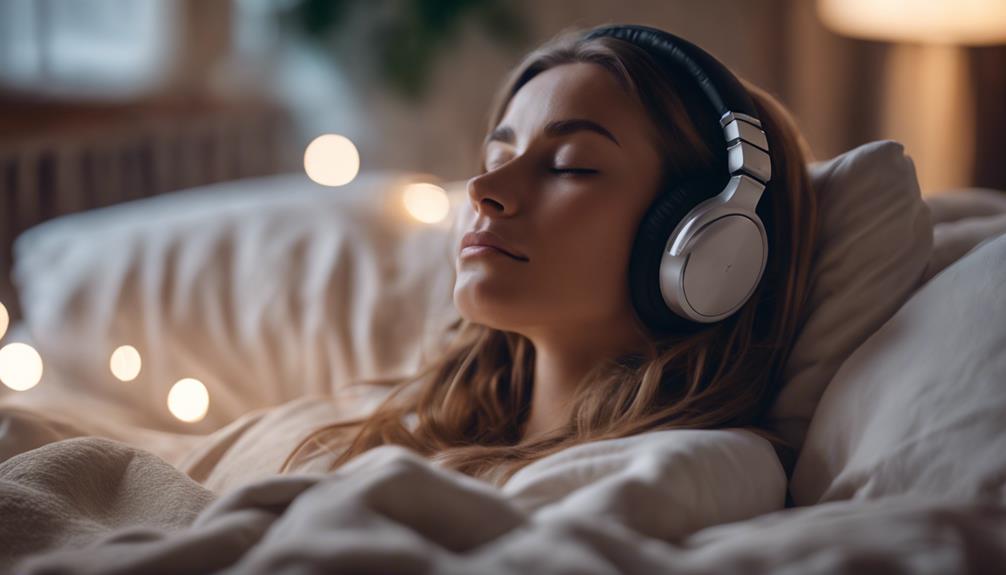
Improving sleep quality naturally involves implementing lifestyle changes and practices that support the body's natural sleep-wake cycle. One vital aspect is developing a consistent bedtime routine. Going to bed and waking up at the same time each day helps regulate the body's internal clock, promoting better sleep quality.
Engaging in relaxing activities before bed, such as reading or taking a warm bath, signals to the body that it's time to wind down, making it easier to fall asleep.
Creating a conducive sleep environment is also essential. This includes keeping the bedroom dark, quiet, and cool. Light-blocking curtains, earplugs, or white noise machines can help minimize disturbances that may disrupt sleep.
Additionally, investing in a comfortable mattress and pillows that support proper alignment can significantly improve sleep quality.
Self-Hypnosis for Deep Sleep
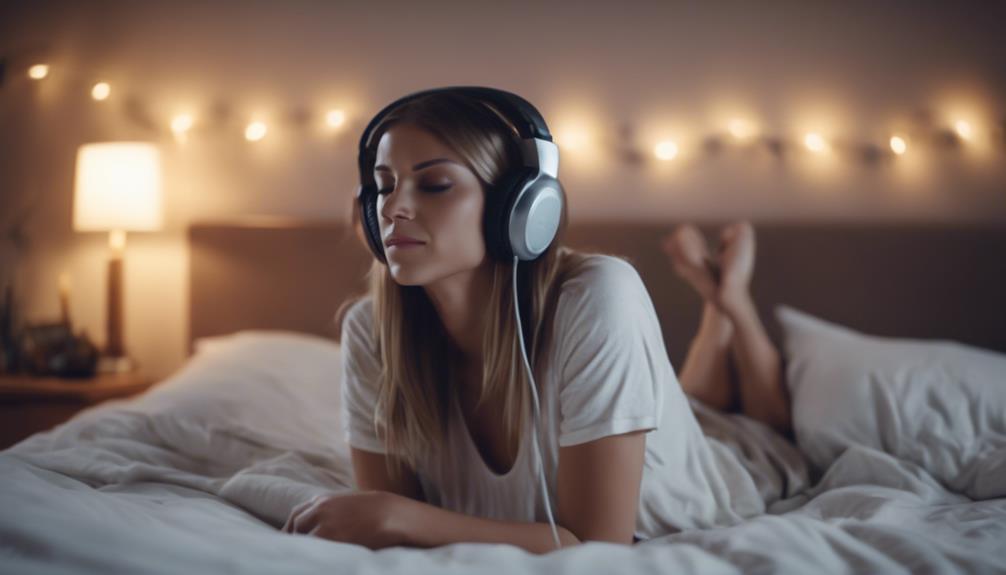
Utilizing self-hypnosis techniques can be an effective method for enhancing deep sleep quality and promoting overall relaxation before bedtime. Sleep meditation, a form of self-hypnosis, involves calming the mind and body to induce a state of deep relaxation conducive to falling asleep and staying asleep throughout the night.
By incorporating hypnotic relaxation techniques into a bedtime routine, individuals can train their minds to enter a state of deep sleep more easily, leading to improved sleep quality and overall well-being.
During sleep meditation, individuals focus on calming visualizations, controlled breathing, and progressive muscle relaxation to quiet the mind and release tension in the body. These practices help in reducing anxiety, stress, and racing thoughts that often interfere with falling asleep.
Hypnotic relaxation techniques can also assist in achieving a deeper level of restorative sleep, allowing the body to undergo essential processes for physical and mental rejuvenation during the night.
Integrating self-hypnosis for deep sleep into a nightly routine can notably enhance sleep quality and contribute to a more refreshed and energized state upon waking.
Overcoming Insomnia Through Hypnosis

Exploring the application of hypnosis techniques for addressing insomnia presents a promising approach to improving sleep quality and overall well-being. Insomnia, a common sleep disorder affecting millions worldwide, can have debilitating effects on daily functioning and quality of life.
Hypnosis, when used in conjunction with established interventions like sleep hygiene practices and cognitive therapy, can offer a holistic approach to overcoming insomnia. Here are some ways in which hypnosis can help individuals struggling with sleeplessness:
- Enhancing relaxation: Hypnosis techniques can induce a state of deep relaxation, helping to quiet the mind and prepare the body for sleep.
- Changing negative thought patterns: Through hypnosis, individuals can address underlying anxieties and worries that may be contributing to their insomnia.
- Improving sleep hygiene: Hypnosis can reinforce good sleep hygiene practices, such as maintaining a consistent sleep schedule and creating a restful sleep environment.
- Complementing cognitive therapy: When used in conjunction with cognitive therapy, hypnosis can help individuals reframe their thoughts and beliefs about sleep, promoting a more positive sleep experience.
Self-Hypnosis Techniques for Sleep

Applying self-hypnosis techniques can be a valuable tool for individuals seeking to enhance their sleep quality and address insomnia concerns. Hypnosis techniques can help individuals relax their mind and body, leading to improved sleep patterns.
One commonly used technique is progressive muscle relaxation, where individuals focus on tensing and then relaxing different muscle groups to promote overall relaxation. Visualization techniques can also be effective, where individuals imagine calming and peaceful scenes to quiet the mind before sleep.
Self-hypnosis can aid in reducing stress and anxiety, both of which are common culprits of sleep disturbances. By incorporating positive affirmations during a hypnotic state, individuals can reframe negative thought patterns surrounding sleep, promoting a more restful night.
These techniques can be further enhanced by listening to self-hypnosis audio specifically designed for sleep improvement. The guided instructions and soothing background music in these audios can deepen the hypnotic state and enhance the effectiveness of the techniques for better sleep.
Frequently Asked Questions
Can Self-Hypnosis Audio Be Used by Everyone?
Self-hypnosis audio can be utilized by many individuals, yet its effectiveness may vary due to individual differences. Pre-existing conditions such as severe mental health disorders or epilepsy can be contraindications, warranting caution and professional guidance.
Are There Any Side Effects of Using Self-Hypnosis for Sleep?
As with any therapeutic intervention, self-hypnosis for sleep may present potential risks if not used mindfully. Negative effects can arise if precautions are not taken. Safety precautions, including professional guidance, are essential.
How Long Does It Take to See Results With Self-Hypnosis Audio?
The effectiveness timeline of self-hypnosis audio for better sleep varies among individuals due to factors like suggestibility and consistency. While some may notice improvements within a few sessions, others may take several weeks.
Is It Safe to Use Self-Hypnosis Audio Every Night?
Using self-hypnosis audio every night can be safe for most individuals. However, excessive use may lead to dependency or reduced effectiveness over time. It's important to balance frequency of use with potential risks to guarantee long-term positive impact.
Can Self-Hypnosis Audio Replace Traditional Sleep Medications?
Self-hypnosis audio can serve as an alternative therapy for sleep disturbances, offering a natural remedy that aligns with a non-pharmacological approach to sleep management. It presents a holistic treatment option worth considering as a supplement to traditional sleep medications.
Conclusion
To sum up, utilizing self-hypnosis audio for better sleep offers a natural and effective way to improve sleep patterns, reduce stress, and enhance sleep quality.
By incorporating self-hypnosis techniques into your bedtime routine, you can potentially overcome insomnia and achieve deep, restful sleep.
So, why not give self-hypnosis a try and see how it can transform your sleep experience? After all, who wouldn't want a better night's rest without the need for medication or other sleep aids?

Take the Next Step, Make An Appointment
Do not be afraid to reach out to me, Mark , to assist you in any issues you might have. Need a good listener or someone to confidentially talk too? . Life Coaching is 45 minute session, once a week.
Self-Hypnosis is taught in one session, individual sessions or in a group, and lasts a lifetime. Most Hypnotherapy sessions including Age regression last 2 hours and EFT Sessions are usually handled with a one hour session
To make an appointment, first listen to the Pre-talk and fill out the Complementary Healthcare Provider Disclosure. The use the Contact Form to request an appointment with, Mark, The Bohol Hypnosis Expert.
Self-help downloads are available to help you with specific problems. The self-hypnosis program to teach you how to self-hypnotize yourself is available here.

